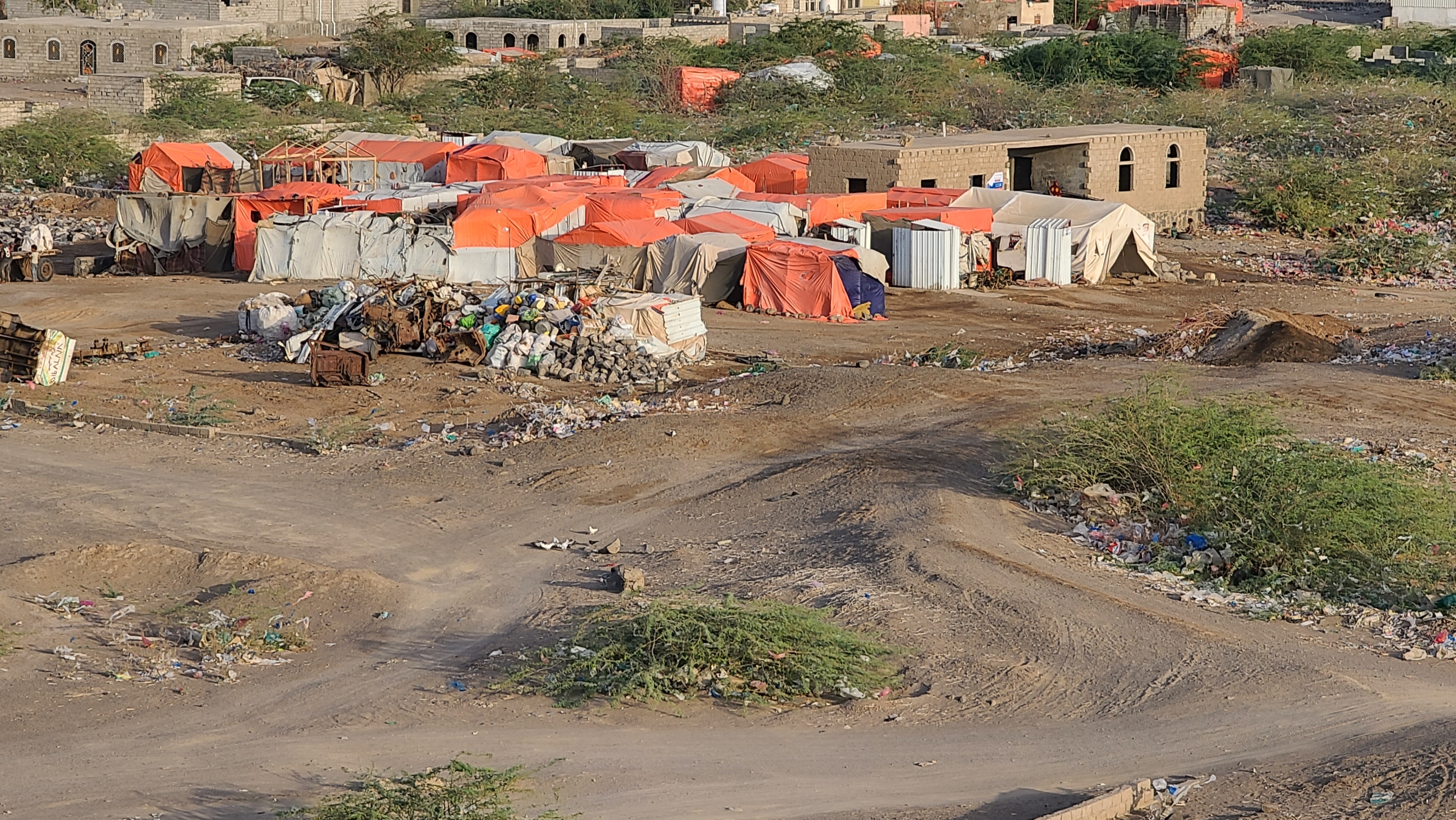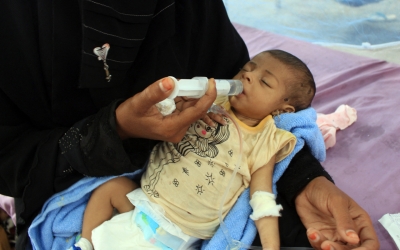Russia-Ukraine war: Conflict leaves displaced Yemenis fighting for survival

Life for Abdulrahman Abadel has long been a struggle.
Living as a displaced person in a makeshift camp in the Mocha district of Taiz in southwest Yemen, with little access to food, water, and other basic services, was already a hard existence.
But now the outbreak of conflict almost 4,000km away in Ukraine is heaping further pressure on Abadel as the war pushes up the price of food and fuel.
'This war in Ukraine left us thinking about the future and instead of praying God to stop the war in Yemen, I also pray God to stop the war in Ukraine so at least we will have food coming to Yemen'
- Abdulrahman Abadel
A father of seven, Abadel fled his home in Hodeidah’s Tuhaytah district to Taiz in August 2018 as fighting arrived at his village and he saw his neighbours being killed.
“The war forced us to flee our homes, lose jobs and leave our loved ones. That wasn’t easy for us but we had nothing to do but to flee,” he told Middle East Eye.
New MEE newsletter: Jerusalem Dispatch
Sign up to get the latest insights and analysis on Israel-Palestine, alongside Turkey Unpacked and other MEE newsletters
“I took my children and fled while there were dead bodies under ruins.”
Abadel arrived at the makeshift camp in Mocha where some other displaced families were already staying and set up the tent where he has been living ever since, trying to survive.
A dramatic increase in the price of essentials, though, means his future is again uncertain.
“We are victims twice, once by the Yemen war and the other by the Ukraine war, and we can't afford the impact of this latest war as it impacts our food,” he said.
“It was the first time in my life I heard about Ukraine, from the trader when I went to buy wheat - he said that the war in Ukraine is the reason behind the expensive wheat prices, as it comes from Ukraine and Russia.”
Yemen imports more than 30 percent of its wheat from Russia and Ukraine and attention is now turning to the possible impact a disruption to wheat supplies could have on the already desperate situation in the country.
More than 17 million people require food aid in Yemen, and that number could rise to 19 million in the second half of 2022, UN bodies have said.
Those experiencing emergency levels of hunger could reach 7.3 million by December.
“I’ve already sent four of my children to work and the incomes of all of us aren’t enough to provide for the family," said Abadel.
"This war in Ukraine left us thinking about the future and instead of praying God to stop the war in Yemen, I also pray God to stop the war in Ukraine so at least we will have food."
Increasing demand for food
There are around four million internally displaced people in Yemen. Many of them live in makeshift camps and are in dire need of basic services.
Abadel, like many other residents in his area, used to work as a fisherman and sometimes went to work with farmers - he always had enough food.
But he and others began to struggle in 2015 when the Saudi-led coalition, which that year began launching air strikes on the Iran-aligned Houthi rebels, started to impose restrictions on fishermen and target some farms in the area.
'We hope this war will stop and traders can import food as usual. What Yemenis have been suffering from is enough'
- Ahmed Hamzah, trader
“Getting enough food wasn’t a problem before we fled our homes as we used to eat from the sea and the farms and I used to have money to buy any needs of the family,” he recalled.
“The suffering started since we arrived here and many times we have one or two meals per day which usually contains bread and tea for breakfast and dinner and rice for lunch.”
Abadel’s children don’t go to school as he can't afford it and has been forced to ask some of them to work in the market, carrying items for people and helping their family fetch water, and collect firewood.
“I rarely have work as a building labourer and I use that money to buy food, and sometimes I receive aid from organisations and that helps," he explained.
Some 80 percent of Yemen's population of about 30 million people depend on aid for survival after seven years of a conflict that has killed almost 380,000 people, directly or indirectly, according to the UN.
Wheat used to cost 29,000 Yemeni riyal ($22) per 50kg before the war in Ukraine; today it costs YR41,000 ($31) in pro-government areas, with a similar increase in the Houthi-controlled areas.
There is also a fuel crisis in Houthi-controlled areas, as well as some pro-government areas, with many buying from the black market.
The fuel crisis is another factor in the increased prices of food in Yemen, though it is still not clear how the two are affecting each other.
Ahmed Hamzah, a trader in Taiz, confirmed that there was an increase in demand for food, and suggested this was pushing up prices as traders grew increasingly worried about imports.
“Customers buy food in big quantities and this creates worries among us as traders because we hear about the war in Ukraine and customers don’t wait until everything is gone,” he told MEE.
“The war in Ukraine can have its impact on food prices but the increased demand for food also creates another problem - so we hope this war will stop and traders can import food as usual. What Yemenis have been suffering from is enough.”
Begging
Amin Mansour, a father of six who also lives in a camp for displaced people in the Mocha district, said he had been struggling to provide his family with enough food since he fled his home in Hodeidah in 2016.
“It has been six years now in displacement but the last month was the worst as prices went up to unaffordable levels - not only wheat prices but also other food items and the transportation fees were doubled,” he told MEE.
Mansour’s children also don’t go to school and the increase in food prices has forced him to send his children to beg in the streets and markets.
“No one wants to see his children beg in the streets but the increase in prices forced me to, as begging is still better than starvation,” Mansour added.
“Traders say that the coming days will be even worse because of the war in Ukraine - so [there is] no way to survive but begging.”
He said he hoped that war stopped in Ukraine because Yemenis weren't able to depend on themselves to produce food.
“When I go to the market or I sit with friends, they talk about the war in Ukraine and how Yemenis may starve if it continues. I’m very worried about that as I can’t save food for my children, so I hope that wars stop and my children don’t suffer.”
Another resident of Taiz, Galal al-Sunah, who works for a local company, stated that he bought three 50kg bags of wheat and three bags of wheat flour, in addition to other basic food.
“The local war left its impact on us but I believe that the war in Ukraine will also have a bad impact on us as we import the majority of our food from abroad,” he told MEE.
Sunah said that he was worried about the impact of the Ukraine war, adding that people had already witnessed the impact on the prices in markets.
“I still remember when Yemen witnessed a lack of food in 1990 because of the Iraq-Kuwait war - so I bought food at least enough for the coming five months."
Middle East Eye delivers independent and unrivalled coverage and analysis of the Middle East, North Africa and beyond. To learn more about republishing this content and the associated fees, please fill out this form. More about MEE can be found here.






